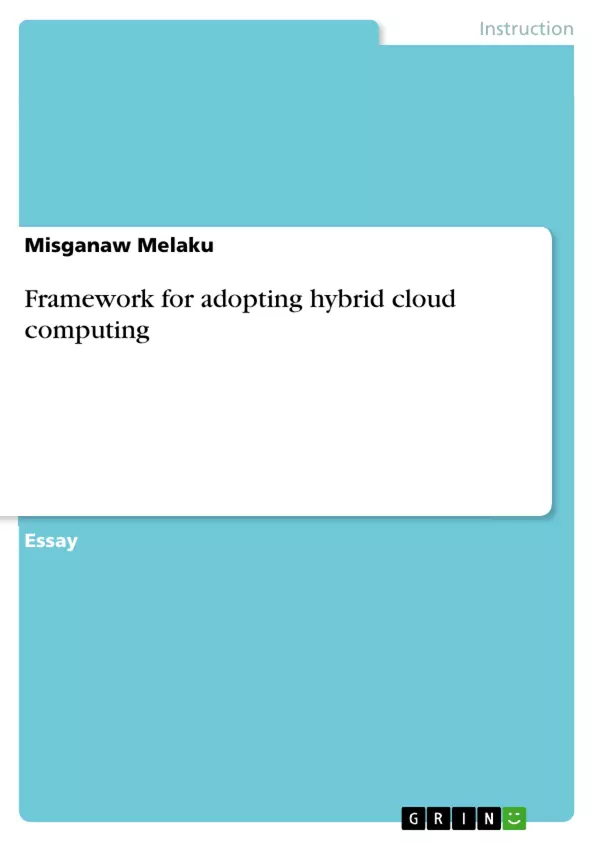The long way it comes, the dynamic change it has, the specialization and transparent nature of its services and the relative advantage it has over the previous computing technologies has provided, cloud computing has attained the maturity level and position where it is now. Security, privacy, trust and location risks are some of the factors that hinder the adoption of cloud computing and it is not well implemented in organizations of developing countries. But the adoption of cloud computing could transform the workflow of organizations to efficient, cost effective and manageable environment. To transform the current working environment to cloud computing environment, it needs to have a sound, comprehensive and agile adoption framework. Its room for keeping the computing and management of sensitive data and applications in house and going public for additional computing requirements, makes the hybrid cloud computing the best fit for construction companies. The proposed hybrid Cloud Computing Adoption framework can support construction companies to determine and understand the contexts they need to consider when adopting cloud computing.
Primary and secondary data are used to develop the proposed adoption framework. On top of that, the National Cloud Computing Policy, Strategy and Roadmap of Ethiopia, Technological, Organizational and Environmental cloud adoption framework was used as a theoretical lens in the study. This paper is proposed to support informed judgment rather than strict robotic rule based implementation. The study findings are believed to help organizations and researchers to understand cloud computing adoption contexts, requirements, to measure their risk, to migrate their services to cloud from all types and to connect and integrate different services as a single system. Future direction and security concerns have been addressed in our framework.
Inhaltsverzeichnis (Table of Contents)
- Introduction
- Related Work
- The Proposed Solution
- Proposed Framework for Adopting Hybrid Cloud Computing
- Discussion
Zielsetzung und Themenschwerpunkte (Objectives and Key Themes)
This research paper proposes a comprehensive framework for adopting hybrid cloud computing, specifically tailored for construction companies in Ethiopia. The framework aims to guide organizations in navigating the complexities of cloud adoption, considering their specific needs and challenges.
- Understanding the Context of Cloud Adoption in Construction
- Developing a Framework for Hybrid Cloud Computing Adoption
- Addressing Security and Privacy Concerns in Cloud Computing
- Evaluating the Proposed Framework Through Design Science Research
- Exploring the Potential of Hybrid Cloud Computing for the Construction Industry
Zusammenfassung der Kapitel (Chapter Summaries)
- Introduction: This chapter sets the stage for the research by discussing the evolution of computing technologies, highlighting the growing importance of cloud computing, and introducing the various deployment models of cloud computing. It emphasizes the relevance of hybrid cloud computing for construction companies, particularly in the context of Ethiopia.
- Related Work: This chapter provides a review of existing literature on cloud computing adoption frameworks, highlighting relevant studies and their limitations. It sets the foundation for the proposed framework by identifying gaps in previous research and emphasizing the need for a more comprehensive approach.
- The Proposed Solution: This chapter delves into the proposed framework for adopting hybrid cloud computing. It outlines the framework's structure, methodology, and key components, emphasizing the importance of considering both internal and external factors. The chapter also addresses the evaluation of the framework, drawing upon design science research principles and metrics.
Schlüsselwörter (Keywords)
The research centers around the key concepts of cloud computing, hybrid cloud, adoption frameworks, security, privacy, and trust. The study explores these concepts within the context of construction companies in Ethiopia, aiming to provide insights into the specific challenges and opportunities associated with cloud adoption in this sector.
Frequently Asked Questions
What is the main goal of the proposed hybrid cloud framework?
The framework aims to support construction companies, particularly in Ethiopia, in understanding the contexts and requirements for adopting hybrid cloud computing effectively.
Why is hybrid cloud computing suitable for construction companies?
Hybrid clouds allow companies to keep sensitive data in-house while utilizing public cloud resources for additional computing requirements, offering a balance of security and scalability.
What are the main risks hindering cloud adoption in developing countries?
Factors such as security, privacy, trust, and location risks are significant barriers to the implementation of cloud computing in organizations within developing nations.
Which theoretical lenses were used to develop this framework?
The study utilized the Technological, Organizational, and Environmental (TOE) framework, along with the National Cloud Computing Policy and Roadmap of Ethiopia.
How can this framework help researchers and organizations?
It helps them understand adoption contexts, measure risks, migrate services, and integrate different services into a single, manageable system.
- Arbeit zitieren
- Misganaw Melaku (Autor:in), 2017, Framework for adopting hybrid cloud computing, München, GRIN Verlag, https://www.hausarbeiten.de/document/444219


